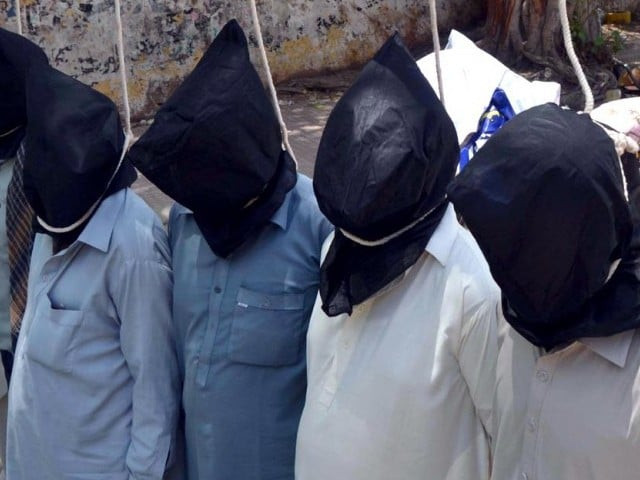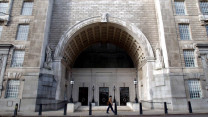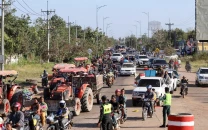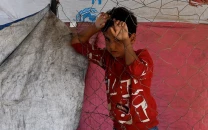Pakistan, Saudi Arabia fuel surge in worldwide executions to 25-year high
Amnesty says surge in worldwide executions highest since 1989

PHOTO: INP
The surge was largely fuelled by Iran, Pakistan and Saudi Arabia, the London-based human rights organisation said in its annual report on death sentences and executions worldwide.
The 1,634 figure does not include China, which is thought to have killed thousands of its own citizens.
Pakistan executed 332 after reinstating death penalty: report
Death penalty data is "treated as a state secret" by Beijing, Amnesty said, as it is by Vietnam and Belarus.
Recorded executions were up by 54 per cent on 2014's figure of 1,061.
Some 89 per cent of those executions were carried out by Iran, Pakistan and Saudi Arabia alone.
"The rise in executions last year is profoundly disturbing," said Amnesty secretary general Salil Shetty.
"Not for the last 25 years have so many people been put to death by states around the world.
"Iran, Pakistan and Saudi Arabia have all put people to death at unprecedented levels, often after grossly unfair trials. This slaughter must end.
"Thankfully, countries that execute belong to a small and increasingly isolated minority."
Pakistan lifted a six-year moratorium on the death penalty following the Peshawar school attack in December 2014.
It executed 326 people in 2015, while Saudi Arabia put 158 people to death.
Iran executing at least 977 people is at odds with its opening up to the West after striking a deal with world powers last year on its nuclear ambitions, Amnesty said.
"Western countries are starting to build commercial ties and trade missions," said James Lynch, Amnesty's Middle East and North Africa deputy director.
"However, human rights has been absolutely left in the margins," he told AFP. "That risks undermining all these efforts."
Military trial: PHC stays execution of three convicted terrorists
He said that since the mid-1980s, around half of those people executed in Saudi Arabia have been foreigners, largely migrant workers who did not speak Arabic and who had little legal assistance.
For the first time ever, the majority of the world's countries have abolished the death penalty for all crimes.
Fiji, Madagascar, Republic of Congo and Suriname fully abolished the death penalty in 2015, taking the total number of countries to do so to 102.
In China, Amnesty said there were signs that the number of executions has decreased in recent years, but it could not verify this.
In August, nine crimes were removed from the list of offences punishable by death, bringing the total down to 43.
"We've been urging the Chinese government to come clean for years," Nicholas Bequelin, Amnesty's East Asia regional director, told AFP.
"Executing several thousand people a year is really very serious and China knows it would be the black sheep of the international community if it was to release the numbers.
"What China needs is the very high number of executions and the judicial procurement of organs for transplant (from those killed) to come to light for the government to be moved into doing the right thing."
People were executed in 25 countries in 2015. The methods used were beheading, hanging, lethal injection and shooting.
Amnesty said its reports indicted that four people in Iran and at least five in Pakistan were executed for crimes committed when they were aged under 18.
Saudi Arabia puts murderer to death in 72nd execution of 2016
Worldwide, people were sentenced to death or executed for murder, drug-related offences, corruption, armed robbery, adultery, aggravated rape, rape, apostasy, kidnapping, and insulting the Prophet (PBUH) of Islam.
A total of 28 people were executed in the United States.
Forms of treason, including "acts against national security", "collaboration" with a foreign entity, "espionage", "questioning the leader's policies", participation in "insurrectional movement" were among those punished with death sentences.
Amnesty recorded a drop in the number of death sentences imposed in 2015 compared to 2014, but this was partly due to difficulties in corroborating data, the charity said.
At least 1,998 people were sentenced to death in 61 countries.
At least 20,292 people worldwide were under sentence of death at the end of 2015.
Amnesty tally of executions worldwide
Here is the number of executions and death sentences imposed by countries around the world in 2015, according to Amnesty International's annual report on the death penalty, published Wednesday.
Note: Plus symbol indicates total is a minimum figure.
Reported executions total, 2015:
1000s (estimated) China
977+ Iran
326 Pakistan
158+ Saudi Arabia
28 United States
26+ Iraq
25+ Somalia
22+ Egypt
14 Indonesia
10 Chad
8+ Yemen
6 Taiwan
5+ South Sudan
4 Bangladesh
4 Singapore
3 Japan
3 Sudan
2 Jordan
2 Oman
1 Afghanistan
1 India
1 United Arab Emirates
0+ Malaysia
0+ North Korea
0+ Vietnam
Amnesty was unable to confirm whether judicial executions took place in Syria.
Army chief signs execution orders of 13 terrorists
Minimum of two executions attributed to China, Malaysia, North Korea and Vietnam, giving final figure of 1,634.
Reported death sentences in 2015 (10 highest totals):
1000s China (estimated)
538+ Egypt
197+ Bangladesh
171 Nigeria
121+ Pakistan
89+ Iraq
75+ India
62+ Algeria
52 United States
51+ Sri Lanka
47+ Vietnam
At least 1,998 people were sentenced to death in 61 countries.



















COMMENTS
Comments are moderated and generally will be posted if they are on-topic and not abusive.
For more information, please see our Comments FAQ